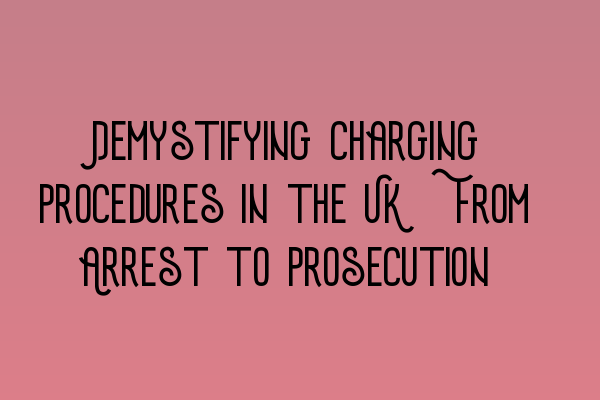Demystifying Charging Procedures in the UK: From Arrest to Prosecution
When it comes to the criminal justice system in the UK, charging procedures can often be confusing and overwhelming for individuals who are unfamiliar with the legal process. Whether you are an aspiring criminal solicitor or just interested in understanding how the system works, this article aims to demystify the charging procedures from arrest to prosecution.
Arrest and Detention
It all starts with an arrest. When someone is suspected of committing a criminal offense, the police have the power to arrest and detain them. An arrest can occur either with or without a warrant, depending on the circumstances and the severity of the alleged crime.
If the police have evidence to suggest that a person has committed a crime, they can arrest the individual without a warrant. This usually happens when a crime has been committed in the presence of a police officer or if the police have reasonable grounds to believe that the person should be arrested.
On the other hand, if the police need to arrest someone but do not have enough evidence to do so without a warrant, they can apply for an arrest warrant from the court. This usually occurs when the police need to gather further evidence or when the suspect is not present at the scene of the crime.
After being arrested, the individual can be held in police custody for a certain period of time. The police have the power to detain a suspect for up to 24 hours without charge. During this time, they can question the suspect, gather evidence, and decide whether to release the individual or bring charges.
Charge or Release
Once the police have gathered enough evidence, they must make the decision to either charge the individual or release them without charge. This decision is based on whether there is enough evidence to provide a realistic prospect of conviction.
If the police decide to charge the suspect, they will provide them with a written charge sheet outlining the offense(s) they are being charged with. The suspect will then be either released on bail, released under investigation, or kept in custody to await a court appearance.
On the other hand, if the police do not have enough evidence to charge the suspect, they must release them without charge. However, this does not mean that the investigation is over. The police may continue their investigation and gather further evidence before deciding whether to charge the suspect at a later stage.
Court Proceedings
Once the suspect has been charged and a court appearance is imminent, the case moves into the court proceedings stage. This is where the suspect’s guilt or innocence will be determined by a judge or jury.
The court proceedings involve a series of hearings, including the plea hearing, case management hearings, and the trial itself. During these hearings, the prosecution will present their evidence and arguments, and the defense will have the opportunity to challenge the evidence and present their own case.
The outcome of the trial will depend on the strength of the evidence presented by both sides and the decision of the judge or jury. If the defendant is found guilty, they will be sentenced accordingly. If they are found not guilty, they will be acquitted and released.
Conclusion
Understanding the charging procedures in the UK is crucial for anyone involved in the criminal justice system, including solicitors, law students, and individuals facing criminal charges. By knowing the process from arrest to prosecution, you can navigate through the system more confidently and make informed decisions.
If you’re preparing for the SQE exams or looking for practice materials and preparation courses, be sure to check out our SQE 1 Practice Exam Questions and SQE 1 Practice Mocks FLK1 FLK2. We also offer comprehensive SQE 2 Preparation Courses and SQE 1 Preparation Courses to help you succeed in your legal career.
For more information on the SRA SQE exam dates and updates, visit our page on SRA SQE Exam Dates. Stay prepared and stay informed!
